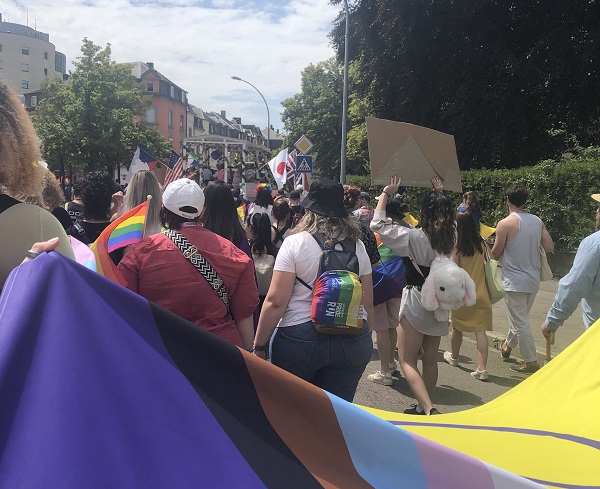 Pride march in Esch-sur-Alzette, 2023;
Credit: Otilia Dragan/Chronicle.lu
Pride march in Esch-sur-Alzette, 2023;
Credit: Otilia Dragan/Chronicle.lu
On Monday 22 July 2024, the Chamber of Deputies (Luxembourg’s parliament) published details of a public petition calling for a ban on teaching LGBTQ+ content to minors (persons under the age of eighteen) in schools that has since gained lots of traction, having collected 7,462 votes out of the required 4,500 for it to be debated, around four days later.
Petitions published in July that gathered at least 4,500 signatures by 20 August 2024 will be publicly debated in Luxembourg’s parliament.
Petition number 3198 cited differences in religious and family values as it called for the exclusion of “LGBT topics from curricula intended for minors or provide options for families to choose whether their children participate in them or not”. Despite emphasising that it is not “intended to discriminate or encourage hatred towards LGBT people”, the petition aims to warn of perceived risks of “disrupting the psycho-pedagogical development of children” should they be exposed to “these topics” at an early age.
The petition is vague, leaving it up to interpretation as to what ages and what information it is referring exactly. None of the “topics” the petition claims could harm children’s development are clarified and it is not clear what the petitioner understands when mentioning LGBTQ+ topics. Because the definition of what “LGBT topics” include is so broad, it could easily be used to justify not speaking of LGBTQ+ people at all, excluding all related information from historical contexts to sexual health and beyond. This echoes sentiments such as Florida’s 2022 “Don't Say Gay” law in the US, which prohibited any classroom instruction on sexual orientation and gender identity in kindergarten and provided that such instruction was permitted in subsequent grades only if “age and developmentally appropriate”.
Local LGBTQ+ rights groups such as Rosa Lëtzebuerg, Planning Familial, CIGALE and many others reacted strongly after the petition requesting the prohibition of teaching LGBT-related topics to minors was published. CID Fraen an Gender held a protest on Thursday 25 July 2024, making noise for five minutes at noon to draw attention to the issue and emphasise that the presence of LGBTQ+ topics in the world cannot be silenced. An open letter with seventeen signatures followed, questioning whether such a petition should be admitted as it attempts to erase information on queer identities, which could be perceived as a violation of ethical principles. Members of the Alternative Democratic Reform Party (ADR) argued that the petition is acceptable, as it reflects a democratic society in which opinions that are “not mainstream” also have their place. To this, I would add that LGBTQ+ topics are, in fact, not “mainstream”, as many people in our society are not informed about them and are readily prepared to avoid and ignore them. Inequality based on identity and sexuality is not something the majority of people will understand, as it is not a personal struggle they face. That is the very difficulty with forming part of a minority – one is often dependent on the goodwill and readiness of society to feel welcome in everyday spaces and daily life.
Among the Luxembourg MEPs who reacted were Tilly Metz and Marc Angel, who on Wednesday 24 July 2024, expressed their condemnation of the petition. Tilly Metz stressed: "Just a few weeks ago, we celebrated love in the streets of Luxembourg, and now over 5,000 signatories want minors to be deprived of their right to information about different types of human relationships. This is absurd."
“I would tell those who have signed that petition that school must prepare kids for real life and society. [...] These issues cannot be avoided and must be addressed in a way that is appropriate to students' ages," Luxembourg’s Minister of Education, Children and Youth, Claude Meisch, said on Thursday. He added that he and the Ministry of Education had a different vision for Luxembourg’s schools.
I would argue, in a similar vein, that LGBTQ+ topics are not and should never be rated “18+”. People who think they should be thus fundamentally misunderstand or ignore and dismiss LGBTQ+ individuals (and this is often done in fear and bad faith, aka “homophobia” and “transphobia”, despite the petition’s claim it was not intended to discriminate). Same-sex relationships, marriages, Pride parades and trans and non-binary people form part of everyday life. If those signing the petition agree that children and adolescents can and should learn about love, (heterosexual) marriage and pregnancy, disability and race, ethnicities, wars, death and other difficult topics before the age of eighteen, the latter should be allowed to know about "LGBTQ+ topics" as well.









